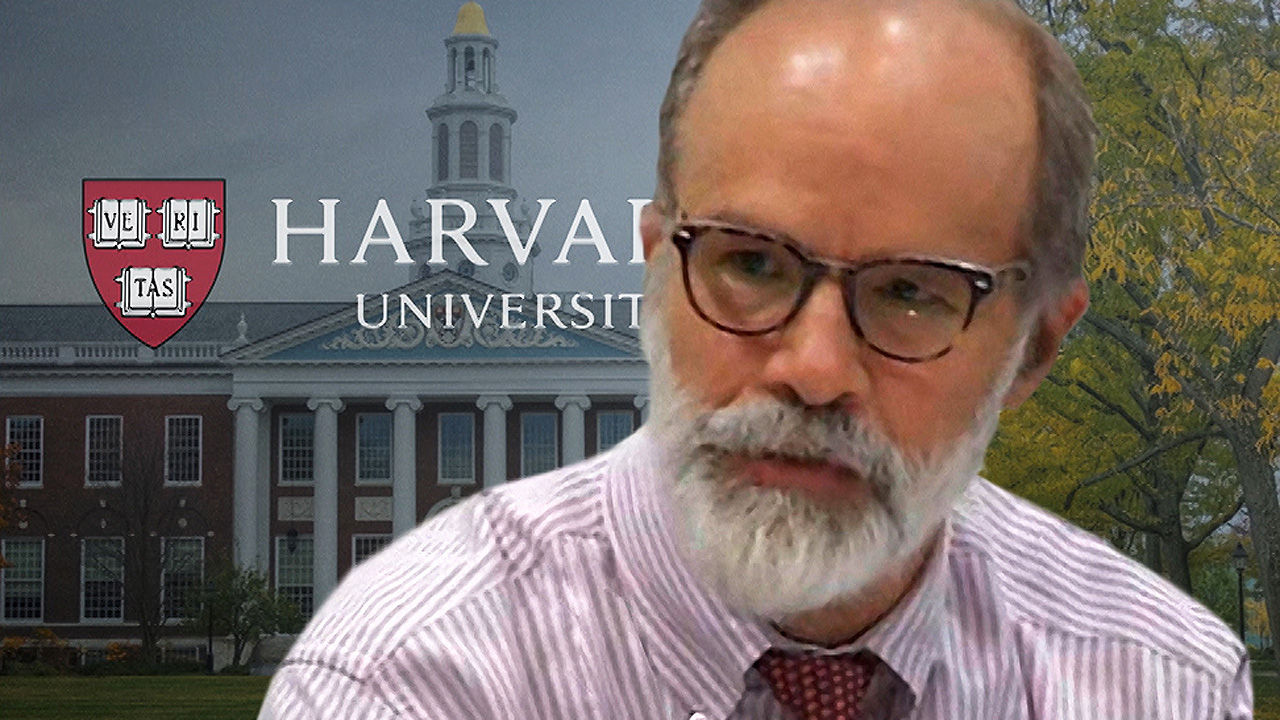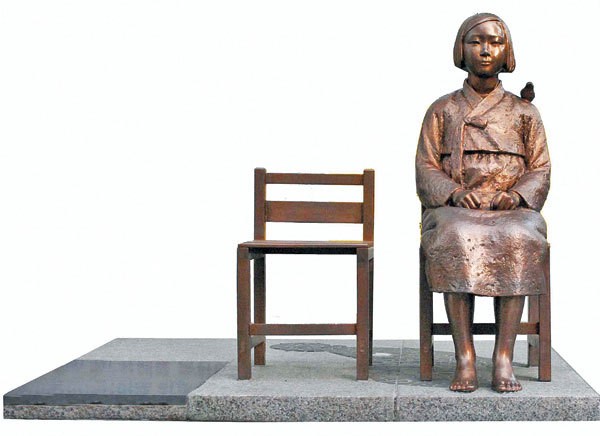A paper titled ‘The Contract for Prostitution in the Pacific War’ recently published by John Mark Ramseyer, a Harvard Law School professor has raised concerns in Korea and abroad. The paper published in the March issue of the ‘International Review of Law and Economics’ is now available online. Professor Ramseyer described the sexual slavery victims (the so-called enforced sex slave) of the Japanese as prostitutes. He insisted it was not enforced but rather the free will of prostitutes, whose human rights were not trampled. The Harvard Law School Korean Student Council (KAHLS) issued a statement condemning Professor Ramseyer saying his thesis begins with an incorrect premise and makes a contriving argument that the Japanese government does not need to be held responsible for the pain endured by the enforced sex slaves.
 |
| ▲ John Mark Ramseyer, a Harvard Law School professor (Photo from SBS News) |
Ramseyer claims that during the Pacific War brothel owners and potential prostitutes signed contracts to meet mutual interests. He explained that prostitutes usually signed a one-to-two-year contract and because of the peculiarity of the situation, prostitutes received a large amount of advance payment and that if they made enough profit, they could leave before the contract expired. Professor Ramseyer stipulated both Japanese women and Korean sex slaves served as willing ‘prostitutes.’ He claimed that neither the Korean nor the Japanese government forced prostitution. He describes the situation as if victims earned money after willingly signing contracts to deliver this type of service. He criticized recruiters in Joseon, who had tricked women to work in brothels over several decades. He also claimed that as the sex slaves worked in battlefields, the contract period was usually shorter, reflecting the high risk of the occupation.
The first part of his report that should be recognized is the section that states that the ‘Japanese government did not force prostitution.' "It wasn't the government that forced women to prostitute themselves," Professor Ramseyer said. "The Japanese military hadn’t cooperated with fraudulent recruiters," he added. This is not true. The Japanese military and the Japanese government did ask recruiters for enforced sex slaves and were involved in the installation and operation of brothels. The work was compulsory, enforced and not a matter of free will. Yohei Kono, Japanese Chief Cabinet Secretary wrote on August 4, 1993, "The brothels were prepared in accordance with the request of the military authorities at the time. And the Japanese military was involved in the transfer of the enforced sex slaves. They also interfered in establishment and management of brothels.” The spokesman also said, "Businessmen were mainly charged with recruiting the enforced sex slaves. However, it has been revealed that there have been many cases of forced recruitment in which the Japanese government was involved. It was a terrible situation under compulsory circumstances," Yohei acknowledged. In fact, the Japanese military was deeply involved in selecting recruiters. On March 4, 1938, Japan's Deputy Minister's Notice said, ‘The Recruitment of Military Sexual Slavery Workers’ called for the dispatch force to select businessmen for the recruitment process and to cooperate closely with the military police and police when recruiting.’ Therefore, Professor Ramseyer's claim that it was not the government that forced prostitution incorrectly shifted the responsibility to private businesses when government documents clearly state the role they played in the process.
Professor Ramseyer said, "Women could return home if they completed the contract period or paid back the prepaid sum of money." This comment also needs to be corrected. The data he cited while making this claim, contains information on contracts that included conditions suggested in 1937 when recruiting Japanese women to send to military brothels in China. However, it is an interpretation that misunderstands the colonies to think that ‘Joseon (Korean) women would have written contracts with the same intention.’ In addition, on the day when Kono’s statement was released, Japan released survey results that proved the enforced sex slaves have always been overseen by military action during the war and that the enforced sex slaves had painful lives with no freedom. By looking at this evidence alone, it is hard to imagine that sex slaves could ever return home on their own.
“Many prostitutes enjoyed higher salaries and more," Ramseyer said. However, according to ‘U.S. Military Interrogation Report’ found at the Maryland State Records Center, the victims earned between 300 and 1,500 yen a month, 50 to 60 percent of which went to the brothel owner. Former enforced sex slave Mun ok-ju sued the Japanese government for damages. She demanded the return of her earnings, but the government refused to pay saying that the 1965 Korea-Japan Claims Agreement ended any responsibility they had for outstanding claims. Japan had still not returned the money before she passed away in 1996.
To better understand what happened to enforced victims of sexual slavery by the Japanese imperial army, the Dankook Herald (DKH) interviewed Ku Kyeong Nam, a professor in the Graduate School of Education at Dankook University (DKU). She said it is important for us to focus on human rights-centered historical education referring to the 2013 UN report by Farida Shaheed entitled, ‘Report of the Special Rapporteur in the Field of Cultural Rights.’ She said Korean intellects from the so-called ‘New Right’ seem to represent history from the Japanese point of view. That is called revisionist history, which is based on the fact that history and the past are always changing depending on new information that surfaces and the research done on this. According to Professor Ku, although history is about interpreting the past, denying historical facts that victims undoubtedly exist is not a different interpretation, but a radical relativism. This being so, the practice of human rights-centered historical education is necessary to preserve the truth.
 |
| ▲ Statue of Peace symbolizes the damage from Japanese military sexual slavery. (Photo from Heraldcrop) |
We asked about the recent issue where the Seoul Central District Court ordered Tokyo to issue financial reparations to enforced sex slaves who were dragged away from their homes to work in front-line military brothels for Japanese soldiers during World War II. Japanese Vice Foreign Minister Takeo Akiba lodged a protest saying the ruling was “utterly unacceptable.” The point of the question was to understand whether Akiba’s statement stems from the distorted view of history education or to gain political advantage. Professor Ku said the political stance may be reflected and the content of the statement had a serious problem, but more importantly, we should focus more on what Japanese citizens think about this problem.
Japan indeed reflected for a while on its militarism in the past after losing World War II, but after 1955, Japanese society chose a more conservative path allowing a group of right-wing nationalists to become mainstream politicians. Nowadays the readjustment of the history of Japan has become mainstream as the ‘Fusosha’ textbook, written by right-wing nationalists, was published for use in schools in 2001. This means that most teenagers in today’s Japanese society, and most young adults in their 20s to 30s who went through the primary, middle, and high school may or may not have a realistic portrayal of history during their education. Young people in Japan have the misconception that the sex slaves were a natural phenomenon during the war. The fact that the judge in the case before the Seoul District Court decided in favor of the plaintiffs had great historical significance as it made clear that despite the adoption of the 1965 treaty between Korea and Japan that was supposed to bring an end to all claims involving forced laborers and sexually enslaved women, the women still have a valid individual claim to compensation. However, Lee Young-soo, a 93 year old survivor of enforced sexual slavery for the Japanese imperial army has been calling on both governments to settle the matter before the International Court of Justice. The activist is not seeking money, but rather an apology from the Japanese government.
During our interview, Professor Ku said, “It’s not an opinion, but an extreme form of relativism that denies the historical fact that the victim exists. The study of history does not even acknowledge denying the truth." She pointed to the 2016 movie Denial to help us better understand the problem. The judge ruled against David Irving, a Holocaust denier in the film. "It's not that you've revised or commented on any historical facts, David Irving, it’s simply that you're a liar. And you are a man of racial prejudice in relation to human rights." Professor Ku reiterated the importance of receiving historical education in terms of universal human rights, and not as a form of national pride. As she says, the enforced sex slave problem is not gossip to be sacrificed for the benefit of the relationship between Korea and Japan. It is a painful history of the abuse of rights of young girls. This incident, where a professor can publish a controversial paper with distorted information is a clear abuse of power, and his actions deserve to be reprimanded.
류시은, 권유지, 정예지 dankookherald@gmail.com

![[Campus Magnifier] Let's Surf the Library!](/news/photo/202404/12496_1765_4143.jpg) [Campus Magnifier] Let's Surf the Library!
[Campus Magnifier] Let's Surf the Library!
![[Campus Magnifier] Let's Surf the Library!](/news/thumbnail/202404/12496_1765_4143_v150.jpg)





